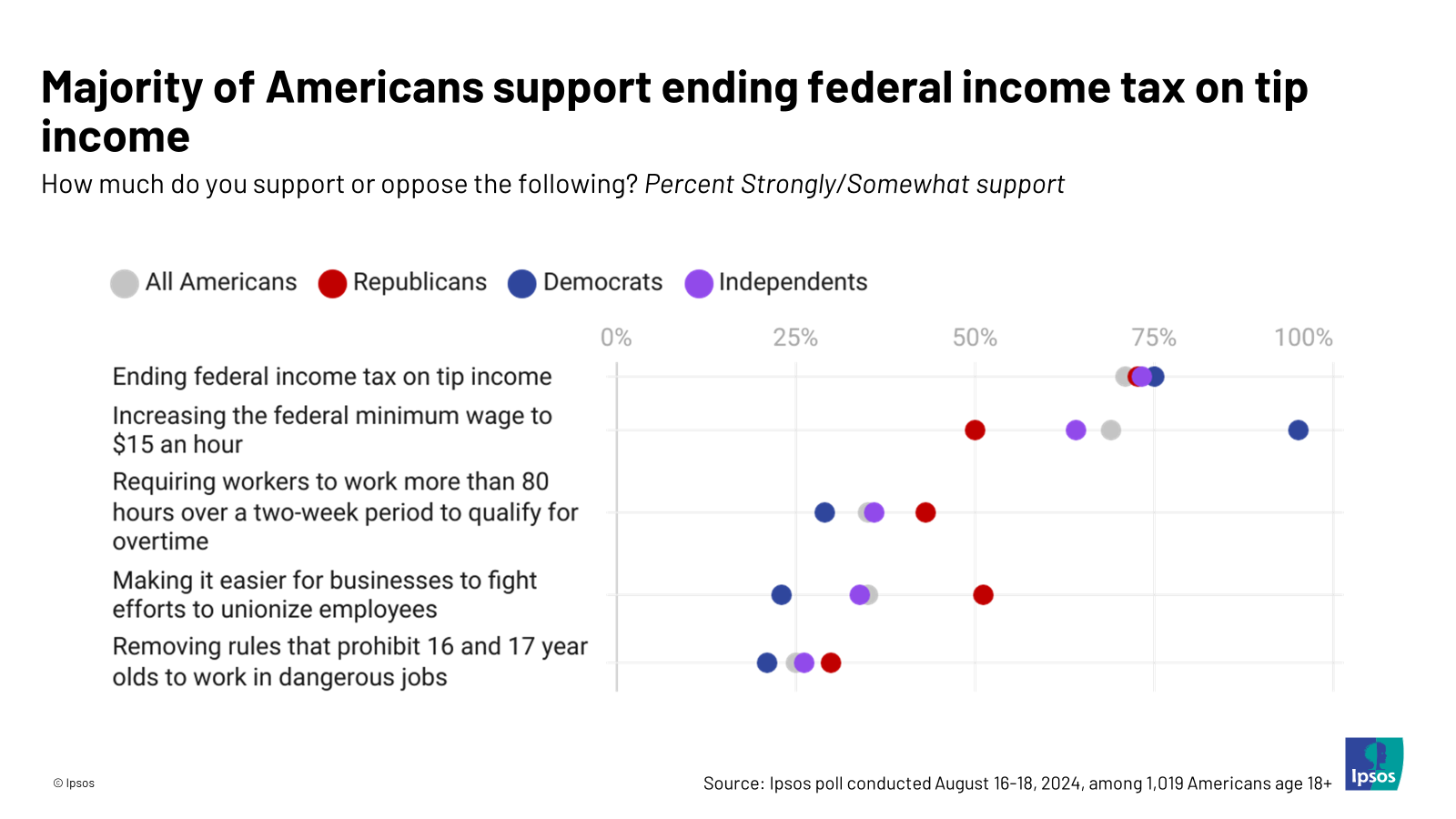Proposed policy to end federal income tax on tips has bipartisan support
Washington DC, August 22, 2024 — A new Ipsos poll finds that a majority of Americans support ending federal income tax on tip income, even across party lines. The plan, which has been proposed by both Republican presidential nominee Donald Trump and Democratic presidential nominee Kamala Harris, is supported by roughly three in four Republicans (73%), Democrats (75%), and independents (73%). However, Americans are more mixed on the potential outcomes of the policy: 54% say they think workers receiving tipped wages would be more financially secure, while 43% say employers would figure out how to pay workers less.
A majority of Americans also support increasing the federal minimum wage to $15 an hour (69%), though there is a significant gap between Democrats (95%), independents (64%), and Republicans (50%). One in three Americans support making it easier for businesses to fight efforts to unionize employees (35%), while 25% supports removing rules that prohibit 16 and 17 year olds to work in dangerous jobs.
About the Study
This poll was conducted by Ipsos from August 16-18, 2024, using the probability-based KnowledgePanel®. This poll is based on a nationally representative probability sample of 1,019 adults age 18 or older.
The survey was conducted using KnowledgePanel, the largest and most well-established online probability-based panel that is representative of the adult U.S. population. Our recruitment process employs a scientifically developed addressed-based sampling methodology using the latest Delivery Sequence File of the USPS – a database with full coverage of all delivery points in the U.S. Households invited to join the panel are randomly selected from all available households in the U.S. Persons in the sampled households are invited to join and participate in the panel. Those selected who do not already have internet access are provided a tablet and internet connection at no cost to the panel member. Those who join the panel and who are selected to participate in a survey are sent a unique password-protected log-in used to complete surveys online. As a result of our recruitment and sampling methodologies, samples from KnowledgePanel cover all households regardless of their phone or internet status and findings can be reported with a margin of sampling error and projected to the general population.
The study was conducted in English. The data for the total sample were weighted to adjust for gender by age, race/ethnicity, education, Census region, metropolitan status, and household income. Party ID benchmarks are from the 2024 National Public Opinion Reference Survey (NPORS). The demographic benchmarks came from the 2023 March Supplement of the Current Population Survey (CPS).
- Gender (Male, Female) by Age (18–29, 30–44, 45-59 and 60+)
- Race/Hispanic Ethnicity (White Non-Hispanic, Black Non-Hispanic, Other, Non-Hispanic, Hispanic, 2+ Races, Non-Hispanic)
- Education (Less than High School, High School, Some College, Bachelor or higher)
- Census Region (Northeast, Midwest, South, West)
- Metropolitan status (Metro, non-Metro)
- Household Income (Under $25,000, $25,000-$49,999, $50,000-$74,999, $75,000-$99,999, $100,000-$149,999, $150,000+)
- Party ID (Republican, Leans Republican, Independent/Other, Democrat, Leans Democrat)
The margin of sampling error is plus or minus 3.2 percentage points at the 95% confidence level, for results based on the entire sample of adults. The margin of sampling error takes into account the design effect, which was 1.12. The margin of sampling error is plus or minus 6.0 percentage points at the 95% confidence level, for results based on the sample of Republican adults. The margin of sampling error takes into account the design effect, which was 1.10. The margin of sampling error is plus or minus 5.7 percentage points at the 95% confidence level, for results based on the sample of Democrat adults. The margin of sampling error takes into account the design effect, which was 1.10. The margin of sampling error is plus or minus 6.0 percentage points at the 95% confidence level, for results based on the sample of independent adults. The margin of sampling error takes into account the design effect, which was 1.15. The margin of sampling error is higher and varies for results based on sub-samples. In our reporting of the findings, percentage points are rounded off to the nearest whole number. As a result, percentages in a given table column may total slightly higher or lower than 100%. In questions that permit multiple responses, columns may total substantially more than 100%, depending on the number of different responses offered by each respondent.
For more information on this news release, please contact:
Chris Jackson
Senior Vice President, US
Public Affairs
+1 202 420-2025
[email protected]
Mallory Newall
Vice President, US
Public Affairs
+1 202 374-2613
[email protected]
About Ipsos
Ipsos is one of the largest market research and polling companies globally, operating in 90 markets and employing over 18,000 people.
Our passionately curious research professionals, analysts and scientists have built unique multi-specialist capabilities that provide true understanding and powerful insights into the actions, opinions and motivations of citizens, consumers, patients, customers or employees. Our 75 solutions are based on primary data from our surveys, social media monitoring, and qualitative or observational techniques.
Our tagline "Game Changers" sums up our ambition to help our 5,000 customers move confidently through a rapidly changing world.
Founded in France in 1975, Ipsos has been listed on the Euronext Paris since July 1, 1999. The company is part of the SBF 120 and Mid-60 indices and is eligible for the Deferred Settlement Service (SRD). ISIN code FR0000073298, Reuters ISOS.PA, Bloomberg IPS:FP www.ipsos.com



